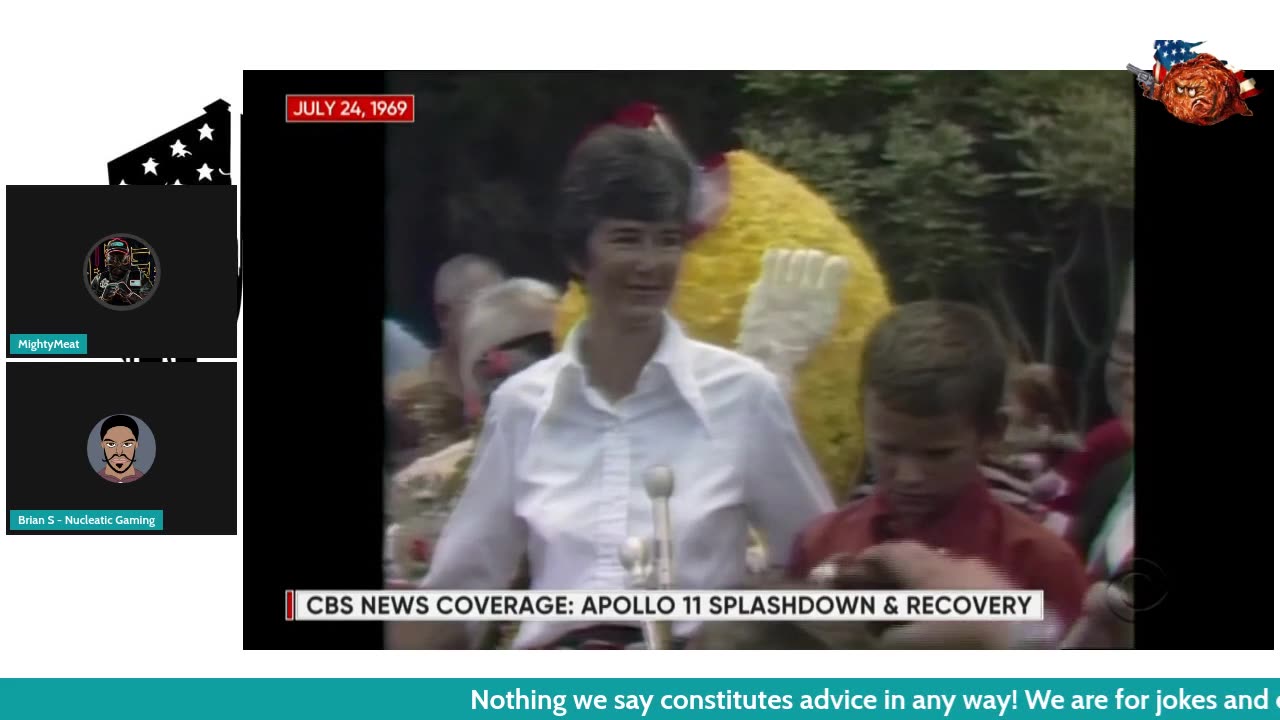Premium Only Content

Apollo 11 Re-LIVE - Astronauts leave the Capsule
Apollo 11 was the first manned mission to land on the Moon and is one of the most iconic events in the history of space exploration. Here are some key facts about the Apollo 11 mission:
Mission Objectives: Apollo 11 was launched by NASA on July 16, 1969, with the primary objective of landing astronauts on the Moon and returning them safely to Earth. The mission aimed to demonstrate the capabilities required for lunar exploration.
Crew: The Apollo 11 crew consisted of three astronauts:
Neil Armstrong: Mission Commander
Edwin "Buzz" Aldrin: Lunar Module Pilot
Michael Collins: Command Module Pilot
Lunar Module: The Lunar Module, named "Eagle," separated from the Command Module in lunar orbit. Neil Armstrong and Buzz Aldrin descended to the lunar surface in the Lunar Module while Michael Collins remained in lunar orbit.
Lunar Landing: On July 20, 1969, Neil Armstrong and Buzz Aldrin piloted the Lunar Module to a successful landing on the Moon's surface in the region known as the Sea of Tranquility.
First Steps on the Moon: On July 20, 1969, Neil Armstrong became the first human to set foot on the Moon. He famously declared, "That's one small step for man, one giant leap for mankind."
Activities on the Moon: Neil Armstrong and Buzz Aldrin conducted various experiments, collected samples of lunar soil and rocks, and planted the American flag on the Moon's surface. They spent about two and a half hours outside the Lunar Module.
Return to Earth: After spending approximately 21 hours on the lunar surface, the Lunar Module's ascent stage rejoined the Command Module in lunar orbit. The astronauts then began their journey back to Earth.
Splashdown: Apollo 11 successfully splashed down in the Pacific Ocean on July 24, 1969. The crew was recovered by the USS Hornet.
Historic Achievement: Apollo 11 was a historic achievement and a major milestone in the Space Race between the United States and the Soviet Union. It demonstrated American technological prowess and fulfilled President John F. Kennedy's goal of landing a man on the Moon before the end of the decade.
Scientific Contributions: The mission brought back valuable scientific data, including lunar rock and soil samples, which provided insights into the Moon's history and the solar system's formation.
Apollo 11's success marked the beginning of a series of lunar missions and was a significant moment in human history. It remains an iconic event, with Neil Armstrong's first step on the Moon being one of the most memorable moments in the 20th century.
-
 1:49:14
1:49:14
Redacted News
6 hours agoTrump is Back! Congress Uncovers New Biden Crimes One Day After He Leaves D.C. | Redacted
138K208 -
 2:09:53
2:09:53
Benny Johnson
6 hours ago🚨President Trump LIVE Right Now Making MASSIVE Announcement At White House News Conference
247K276 -
 2:04:10
2:04:10
Revenge of the Cis
7 hours agoEpisode 1433: Retribution
99.2K13 -
 1:42:50
1:42:50
The Criminal Connection Podcast
10 hours ago $0.77 earnedEddie Hearn talks JOSHUA vs FURY, Working With Frank Warren & The Truth About Turki Alalshikh!
44.1K2 -
 1:00:25
1:00:25
In The Litter Box w/ Jewels & Catturd
1 day agoGolden Age | In the Litter Box w/ Jewels & Catturd – Ep. 724 – 1/21/2025
135K57 -
 57:42
57:42
The Dan Bongino Show
14 hours agoHE'S BACK! (Ep. 2405) - 01/21/2025
1.36M2.34K -
 46:19
46:19
Candace Show Podcast
7 hours agoUH-OH! Elon’s Viral Salute Steals The Inauguration Show | Candace Ep 136
146K392 -
 8:05:01
8:05:01
hambinooo
12 hours agoNO COMMIE TUESDAY
94.9K3 -
 2:08:37
2:08:37
The Quartering
9 hours agoTrump Ends Online Censorship, Foreign Aid, Frees J6 Hostages & Much More In Day 1
135K52 -
 1:33:37
1:33:37
Russell Brand
10 hours agoBudget Cuts, Fires, and the Failures of Leadership – SF523
299K137